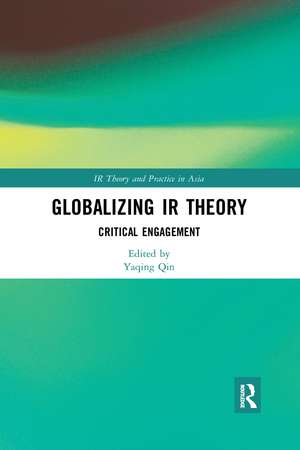Globalizing IR Theory: Critical Engagement: IR Theory and Practice in Asia
Editat de Yaqing Qinen Limba Engleză Paperback – 13 iun 2022
Drawing on scholars with backgrounds in the United States, Europe, Asia and South America, this volume attempts to critically engage with and reflect upon existing traditions of IR theory to produce a deeply pluralist approach. Traditions, cultures, histories and practices from around the world influence their respective theoretical understanding and in turn explain why the Western tradition of IR is insufficient.
This book provides great insight for scholars of IR from around the world, looking for more diversity in IR theory.
| Toate formatele și edițiile | Preț | Express |
|---|---|---|
| Paperback (1) | 256.07 lei 6-8 săpt. | |
| Taylor & Francis – 13 iun 2022 | 256.07 lei 6-8 săpt. | |
| Hardback (1) | 763.81 lei 6-8 săpt. | |
| Taylor & Francis – 7 apr 2020 | 763.81 lei 6-8 săpt. |
Preț: 256.07 lei
Preț vechi: 316.92 lei
-19% Nou
Puncte Express: 384
Preț estimativ în valută:
48.100€ • 51.43$ • 40.67£
48.100€ • 51.43$ • 40.67£
Carte tipărită la comandă
Livrare economică 10-24 aprilie
Preluare comenzi: 021 569.72.76
Specificații
ISBN-13: 9781032336800
ISBN-10: 1032336803
Pagini: 204
Dimensiuni: 156 x 234 mm
Greutate: 0.26 kg
Ediția:1
Editura: Taylor & Francis
Colecția Routledge
Seria IR Theory and Practice in Asia
Locul publicării:Oxford, United Kingdom
ISBN-10: 1032336803
Pagini: 204
Dimensiuni: 156 x 234 mm
Greutate: 0.26 kg
Ediția:1
Editura: Taylor & Francis
Colecția Routledge
Seria IR Theory and Practice in Asia
Locul publicării:Oxford, United Kingdom
Public țintă
Postgraduate and UndergraduateCuprins
List of contributors Acknowledgements 1 Introduction: the global turn in IR and development of non-Western IRT (Yaqing Qin) 2 The second coming? reflections on a global theory of International Relations (Peter J. Katzenstein)
3 How and how not to develop IR theory: lessons from core and periphery (Barry Buzan) 4 Towards a pluralist International Relations theory: a European Union perspective (Mario Telò) 5 Beyond ‘the West/non-West divide’ in IR: how to ensure dialogues as mutual learning (Yong-Soo Eun) 6 Chinese values vs. liberalism: what ideology will shape the international normative order? (Xuetong Yan) 7 Towards a ‘global IR’? A view from Brazil (Oliver Stuenkel) 8 A multiverse of knowledge: cultures and IR theory (Yaqing Qin) 9 Conclusion: From Heaven to Earth — ‘Cultural Idealism’ and ‘Moral Realism’ as Chinese Contributions to Global International Relations (GIR)(Amitav Acharya) Index
3 How and how not to develop IR theory: lessons from core and periphery (Barry Buzan) 4 Towards a pluralist International Relations theory: a European Union perspective (Mario Telò) 5 Beyond ‘the West/non-West divide’ in IR: how to ensure dialogues as mutual learning (Yong-Soo Eun) 6 Chinese values vs. liberalism: what ideology will shape the international normative order? (Xuetong Yan) 7 Towards a ‘global IR’? A view from Brazil (Oliver Stuenkel) 8 A multiverse of knowledge: cultures and IR theory (Yaqing Qin) 9 Conclusion: From Heaven to Earth — ‘Cultural Idealism’ and ‘Moral Realism’ as Chinese Contributions to Global International Relations (GIR)(Amitav Acharya) Index
Notă biografică
Yaqing Qin is Professor of International Studies at China Foreign Affairs University. He is interested in IR theory, culture and social theory, and global governance. He is Executive Vice President of China National Association for International Studies, Associate Member of the Royal Academy of Belgium and Global Fellow at Oslo Peace Research Institute. His work has appeared in many academic journals, including International Studies Review, The Chinese Journal of International Politics and International Relations of the Asia-Pacific. His has published over 100 journal articles and 40 books, including Global Governance: Rebuilding of Order in a Multiplex World (2019), A Relational Theory of World Politics (2018); Future in Retrospect: China’s Diplomatic History Revisited (2016) and Power, Institutions, and Cultures (2005).
Descriere
This book explore the challenges of constructing an alternative, with a dialogue between global and local approaches. Drawing on scholars with backgrounds in the US, Europe, Asia and South America, this volume attempts to critically engage with and reflect upon existing traditions of IR theory, to produce a deeply pluralist approach.







